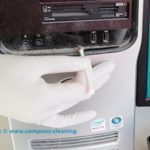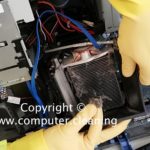Background and Idle Time Computer Defragmentation
Fragmented files can cause a variety of problems within a computer system which in the result make your computer faster and efficient. Over time, as more fragmented files accumulate, computer users notice their systems run more slowly and may even experience freezing or crashing. By properly defragmenting their system, users can improve the speed and stability of their computers. However, defrag programs often use up many of your computer’s resources.
When to Schedule a Defrag
When a file is saved, it is written to available free space on the hard drive. In some instances, the file to be saved is too large to fit contiguously in one free space. In response, the computer divides the file into multiple pieces and saves the pieces in various free spaces available on the hard drive. This process is known as fragmentation.
Fragmentation slows down computer performance because it forces the computer to retrieve all of the pieces of the file and place them together in the appropriate order before the system is able to open the file.
Fragmentation can lead to several serious computer problems, including freezing, crashing, slowed computer performance and decreased lifespan.
Many users fix fragmentation with disk defragmentation programs, which place file segments together, making them easier for retrieval. In addition, some advanced defragmentation programs consolidate free space to reduce future fragmentation.
Computer users who regularly schedule defrag enjoy a variety of benefits, such as increased performance speed and lower rates of freezing.
Disk Defragmentation Programs
Three main types of disk defragmentation programs are available:
- Built-in
- Freeware
- Purchased
Most computers have a built-in disk defragmentation program, like Windows Disk Defragmenter. While these programs are useful for the minor rearranging of files, many users complain the program is time-consuming and, at times, inefficient.
Computer users can also download freeware defragmentation programs. These offer more advanced features than built-in programs; however, downloading freeware makes systems vulnerable to malicious software, such as Trojans or viruses.
Purchased disk defragmentation programs often offer the most benefits to computer users. They have a variety of features that are beneficial to users, including automatic scans and background defrag.
When To Defragment
Regularly running a disk defragmentation program is important for computer maintenance. Many users purchase disk defragmentation programs because they offer automatic scheduling, allowing the program to run:
- Daily
- During computer idle time
- Monthly
- Weekly.
Disk defragmentation programs run most effectively when they are uninterrupted. Many programs require that the user shut down all programs other than the defragmentation program, which improves the efficiency of the scan.
Advanced disk defragmentation programs can run scans during a user’s idle time, or when the screensaver is running. This allows for users to run scans at their convenience when they are not using the computer.
One of the top disk defragmentation programs that offer idle time defragmentation is PerfectDisk 10 Home Edition by Raxco, which features automatic StealthPatrol to defrag during idle times.
PerfectDisk uses minimal resources to run when a user is idle, allowing for the scan to run without requiring a user to shut down all unrelated programs. You can still work while your computer is being defragged.
Clearly, running a program that offers background and idle time defragmentation gives you one less thing to worry about where your computer’s maintenance is concerned. Automatic scheduling allows you to set it and forget it.
Regardless of which program users utilize, it is important to regularly implement disk defragmentation scans to keep hard drives tidy and computers running at optimal speed.
One Pass Defragmentation
The Benefits of Single-Pass Defrag
Computer users who notice their system speed and performance has slowed may need to defragment their hard drive. Fragmented hard drives can cause a variety of frustrating computer problems that may ultimately decrease the lifespan of your hard drive.
About Fragmented Files and Defragmentation
When a user saves a file, the file is written to the largest available free space on the hard drive. Over time, as files are edited and deleted, free spaces become scattered throughout the drive. As a result, computers must divide files in order to save them to the various scattered free spaces. This is known as fragmentation.
When a user requests to open a file, the computer must retrieve all the segments of the file and place them together logically before the file can be opened. This is a taxing process and causes great delays in a computer’s performance.
Fragmentation can also cause:
- Crashing
- Decreased lifespan
- Delayed performance
- Freezing
To keep a computer running quickly, users must defrag their systems. Disk defragmentation programs place file segments together, keeping the hard drive tidy and facilitating easier file retrieval for the system.
Types of Defrag Programs
Computer users can use three types of defrag programs: built-in, freeware or purchased.
Almost all computer systems come with a built-in defragmentation program, such as Windows Defragger. These programs are often time-consuming and require users to close an unrelated running program. In addition, they are often inefficient and require multiple passes before all the files have been defragmented.
Freeware downloads of defragmentation programs are available, however, many freeware downloads contain malicious software, such as Trojan horses, spyware or viruses.
Purchased defragmentation programs are some of the best available defraggers because they offer a variety of user-friendly features, as well as a thorough defragmentation of the hard drive. When looking for defragging software, you’ll definitely want to consider those that offer one-pass defragmentation.
Features of Defrag Programs
Many computer users purchase disk defragmentation programs because they offer single pass defrag. Unlike multi-pass disk defragmentation programs, one-pass defragmentation places file segments together and consolidate free space in one complete scan.
Many software reviews complain that multi-pass disk defragmentation programs actually promote future fragmentation. As the programs scan through files and place file pieces together, they separate existing free spaces on the hard drive. As a result, free space is scattered throughout the hard drive, encouraging future fragmentation. This can become very frustrating to computer users, as the free space is never consolidated.
In addition, most continuous-pass defragmentation programs run scans during a user’s idle time. This can provide little progress to users with large hard drives, as the scan only has limited amounts of time to defragment files.
Disk defragmentation programs that offer one pass defrag, such as PerfectDisk 10 by Raxco, defragment files and consolidate free space within one pass. Single-pass defrag programs to improve the system’s ability to read and write files, improving performance and stability.





